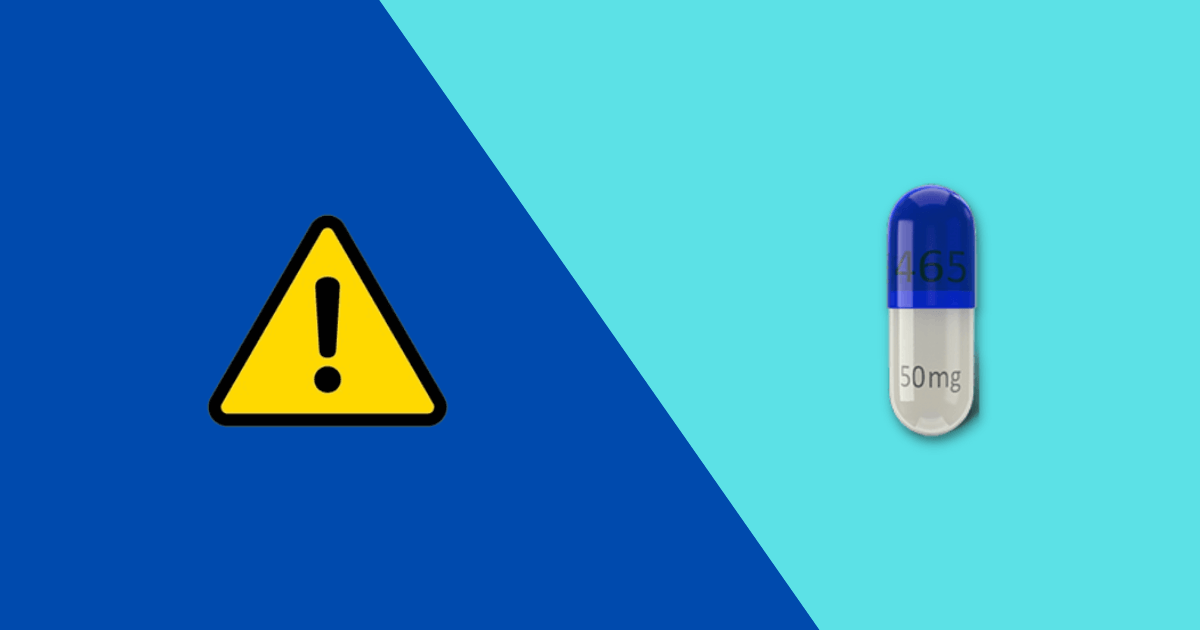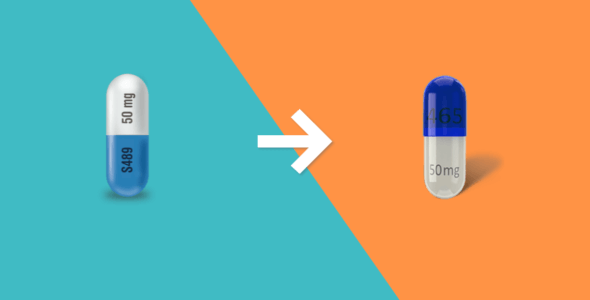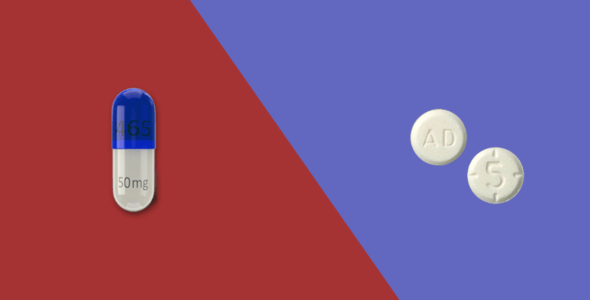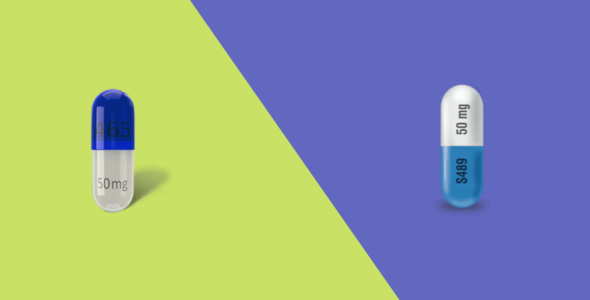Mydayis side effects and how to avoid them
Table of contents
Mydayis is an FDA-approved brand-name medication manufactured by Shire, LLC. It is classified as a central nervous system (CNS) stimulant and is used to treat symptoms of attention deficit hyperactivity disorder (ADHD). The combination of amphetamine and dextroamphetamine is also sometimes used to treat narcolepsy. While Mydayis is generally well tolerated, there are some potential side effects that people should be aware of. The most common side effects of Mydayis include abdominal pain and loss of appetite. Less common but more serious side effects can include serious allergic reactions.
Learn more about the side effects of Mydayis and what you can do to avoid them.
What is Mydayis?
Mydayis (amphetamine/dextroamphetamine) is a long-acting stimulant medication whose active ingredients consist of mixed amphetamine salts. It is approved by the U.S. Food and Drug Administration (FDA) to treat:
- Attention Deficit Hyperactivity Disorder (ADHD) in patients 13 years and older.
Amphetamine products such as Mydayis are non-catecholamine sympathomimetic amines that work in the treatment of ADHD by increasing the release of the neurotransmitters dopamine and norepinephrine in your brain. The increase of these chemicals in the brain is thought to help increase your ability to pay attention, stay focused, and control your impulsivity and hyperactive behaviors. Amphetamines also trigger the release of epinephrine, serotonin, and histamine. It is not known if this contributes to relieving symptoms of ADHD.
How does Mydayis make you feel?
Mydayis may cause insomnia, loss of appetite, weight loss, nausea, irritability, dry mouth, anxiety, diarrhea, and an increased heart rate.
Mydayis dosage
Mydayis is available as extended-release capsules in the following doses: 12.5mg, 25mg, 37.5mg, and 50mg.
Mydayis is typically taken once daily in the morning right after waking up. You can take Mydayis with or without food, but you should take it the same way each time. You should swallow the Mydayis capsules whole. If you have difficulties swallowing, you can open up the capsule and sprinkle it over a spoonful of applesauce. The mixture should then be swallowed immediately without chewing. Do not store the Mydayis and applesauce mixture for later use.
If you miss a dose of Mydayis, skip the missed dose and take your dose the next morning at your regular time. Do not take Mydayis later in the day to make up for a missed dose. Your doctor may periodically stop your Mydayis treatment to check your ADHD symptoms.
If you think you or your child has taken too much Mydayis, contact your doctor or go to the nearest emergency room immediately. Symptoms of too much Mydayis include restlessness, tics (muscle twitches), rapid breathing, confusion, hallucinations, and muscle weakness.
You are advised to read the medication guide provided with this medicine for the drug information and patient information, and always speak with your healthcare provider for medical advice about any changes to your dose so they can monitor and evaluate your condition.
Mydayis side effects
The most common possible side effects of Mydayis in clinical trials compared to placebo include:
- Trouble sleeping
- Abdominal pain
- Loss of appetite
- Weight loss
- Nausea
- Irritability
- Dry mouth
- Increased heart rate
- Increased blood pressure
- Anxiety
Mydayis can cause more serious long-term side effects, including:
- Life-threatening allergic reactions, including angioedema, and trouble breathing
- Serious heart problems such as chest pain and shortness of breath
- New psychotic symptoms
- Changes in sexual desire
- Prolonged erections (in males)
- Sudden death has occurred with the use of CNS stimulants such as Mydayis in pediatric patients with structural heart defects or other serious heart problems. Stroke, heart attack, and sudden death have also been reported in adults. Mydayis should be avoided in patients with structural heart abnormalities and other serious heart problems.
- An increase in blood pressure and heart rate
- Mental health issues such as psychosis or manic symptoms
- Circulation problems, especially in the fingers and toes
- Reduced seizure threshold
- Mydayis use has a high potential for abuse and dependence
If you experience any of these serious side effects, stop taking Mydayis and seek medical attention immediately. You are encouraged to report adverse reactions of prescription drugs to the FDA. Visit www.fda.gov/medwatch, or call 1-800-FDA-1088.
Does Mydayis cause withdrawal symptoms?
Mydayis may cause withdrawal symptoms if stopped suddenly. Speak to your doctor if you experience side effects such as fatigue, anxiety, headaches, or depression.
Can Mydayis cause serotonin syndrome?
There is an increased risk of serotonin syndrome with Mydayis, especially if taken with other serotonergic drugs such as SSRIs and SNRIs. If this occurs, Mydayis should be discontinued, and you should seek immediate medical assistance.
Mydayis drug interactions
When Mydayis is taken with other drugs, it may change the way they work and may increase the frequency and severity of side effects. Make sure your doctor is aware of all prescription drugs, over-the-counter medications, vitamins, and herbal supplements you take, including:
- Antidepressants such as SSRIs (paroxetine), SNRIs, and MAOIs (tranylcypromine)
- Omeprazole, esomeprazole, cimetidine, and other stomach medicines
- Migraine medications such as triptans
- Selegiline
- Haloperidol
- Fentanyl
- Tramadol
- Phenytoin
- St. John’s wort
Before taking Mydayis, be sure to tell your doctor about all of the medications you are taking to ensure they are safe to take at the same time.
Mydayis contraindications
Don’t take Mydayis if:
- Known hypersensitivity to amphetamine formulations or any other ingredients in Mydayis.
- Use of a monoamine oxidase inhibitor (MAOI) within the previous 14 days.
Talk to your doctor before taking Mydayis if you:
- Heart problems, including defects or hypertension (high blood pressure)
- Personal or family history of mental illness, including bipolar disorder, psychosis, depression, or suicidal thoughts or behaviors
- Raynaud’s phenomenon (circulation problems in your fingers or toes)
- History of seizures
- Kidney disease
- Thyroid disease
- Glaucoma
- Are pregnant, plan on becoming pregnant
- Are breastfeeding, or are planning to breastfeed – Mydayis passes into breast milk
You should always check with your doctor or pharmacist before taking any medication, including Mydayis, to make sure it is safe for you.
Is Mydayis better than Adderall?
Mydayis and Adderall are both Schedule II controlled substances and are both liable for drug abuse. They are both central nervous system stimulant medications for the treatment of ADHD. Mydayis will work for up to 16 hours, while Adderall will only last up to 12 hours.
Which is better Vyvanse or Mydayis?
Vyvanse and Mydayis are extended-release medications taken once daily to treat ADHD in adults. They are both FDA-approved for ADHD treatment in children; Mydayis for adolescents 13 years of age and older and Vyvanse for children 6 years of age and older.
While Vyvanse only contains 1 active ingredient, Mydayis is a combination of 4 ingredients. Because Vyvanse needs to be metabolized to work, its abuse potential is less than Mydayis. It also has fewer drug interactions. Mydayis and Vyvanse have not been compared directly in clinical studies, but individual studies have shown them to be effective in treating ADHD in adults and children.
How to avoid Mydayis side effects
The best way to avoid side effects is to take Mydayis as directed by your doctor. Follow your doctor’s instructions carefully, and do not take more or less than prescribed.
If you experience any side effects, talk to your doctor or pharmacist. They may be able to recommend ways to help reduce or prevent some of the side effects.
1. Stick to the recommended dosage
Take your prescribed dose of Mydayis that has been recommended by your healthcare professional. Do not take more or less than prescribed.
2. Monitor your blood sugar levels
If you have diabetes, it is important to monitor your blood sugar levels closely while taking Mydayis. Check your blood sugar levels as directed by your doctor and report any changes to your doctor immediately.
3. Drink plenty of fluids
Drink eight to 10 glasses of water or fluids every day to help prevent dehydration, which can make side effects worse.
4. Avoid alcohol
Avoid drinking alcohol while taking Mydayis as it can increase your risk of side effects.
5. Don’t skip meals
Eating regular meals and snacks will help to prevent low blood sugar levels (hypoglycemia).
6. Check your feet
If you have diabetes, check your feet for any cuts, sores, or redness regularly. Tell your doctor if you experience any problems with your feet while taking Mydayis.
7. Know the signs and symptoms of Mydayis side effects
Signs and symptoms of side effects include abdominal pain and loss of appetite. If you experience any of these symptoms, speak to your doctor for medical advice.
8. Monitor your weight
Mydayis may cause weight loss. If you experience this side effect while taking Mydayis, get medical advice from your doctor.
9. Tell your doctor about all medications you’re taking
Be sure to tell your doctor about all other medications you’re taking, including over-the-counter drugs, vitamins, and herbal supplements, as they can interact with Mydayis.
10. Get regular medical checkups
It is important to get regular medical checkups and monitor your medical conditions. Your doctor will monitor your condition and may adjust your dose of Mydayis as needed.
Medically reviewed
A medical professional has reviewed this article.


Jamie Winn, PharmD
Jamie Winn, PharmD
Dr. Jamie Winn received his Doctor of Pharmacy in 2002 from the University of South Carolina College of Pharmacy, Columbia, SC. Jamie is a medical reviewer for NiceRx.




